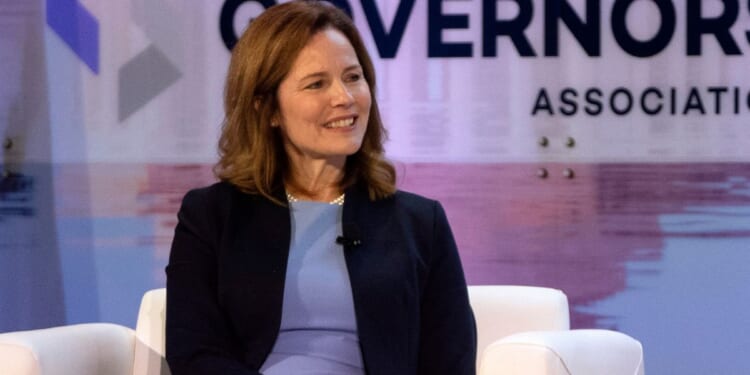No matter how the Supreme Court rules on several cases involving former President Donald Trump this year, one thing seems certain: Some of those who disagree with the ruling will accuse the court of playing partisan politics.
That just isn’t the case, however, according to two SCOTUS justices representing opposing ideological sides.
There is much that Justices Amy Coney Barrett and Sonia Sotomayor disagree on, but they’re aligned on one major issue: Supreme Court justices aren’t beholden to parties or presidents — not even to the president who nominated them.
“Remember, thankfully — for us — presidents don’t last that long, right? There’s eight years,” Sotomayor said, according to Politico.
“So for us to be beholden to one of them is a little crazy, you know?” she added.
Barrett then jumped in — but not to disagree with her colleague.
“Not just beholden to a president, but not to a political party, either,” she said. “Life tenure does insulate us from politics.
“And, so, it’s not just that we’re not Obama judges and Trump judges, but we’re also not Democratic judges or Republican judges. We don’t sit on opposite sides of an aisle. We all wear the same color black robe. We don’t have red robes and blue robes,” she added.
The two made the comments Friday at the winter meeting of the National Governors Association as they spoke on the subject of how disagreements can be resolved more civilly than has often been common in recent years.
Will Trump get an objectively fair judgment by the Supreme Court?
The context, however, also included the fact that SCOTUS will be reviewing cases with “the potential to dramatically reshape the 2024 presidential race,” as Politico put it.
The court will look at whether or not states have the right to keep the former president off the ballot via a particular reading of the so-called “insurrection clause” of the 14th Amendment, for example, and will likely weigh in as well on the charges the former president is facing regarding the Jan. 6, 2020, Capitol incursion.
How the court will rule on those issues remains anyone’s guess, but the two justices — one of whom was nominated by Trump and the other by former President Barack Obama — said that partisan politics aren’t going to be a factor in those rulings.
Disagreements along ideological lines may, of course, happen, but they will be dealt with respectfully by the justices, both women affirmed.
“When we disagree, our pens are sharp, but on a personal level, we never translate that into our relationship with one another,” Sotomayor argued.
Barrett mentioned that Sotomayor had once brought Halloween candy to her office for Barrett’s children to take home with them, and that when she first arrived in D.C. and her family was still in Indiana, she received numerous dinner invitations from her colleagues.
“Collegiality isn’t going to make you change your principles,” she said. “But there’s a way to have disagreement and to meet each other where it is possible to meet.”
Interested readers will find video of the entire session available here.
Politico pointed out that the collegial the two justices described appeared at odds with descriptions offered by fellow Justices Elena Kagan and Clarence Thomas in the past couple of years.
I mean, some years are better than other years,” Kagan said after the Supreme Court overturned Roe v. Wade in 2022. “Time will tell whether this is a court that can get back … to finding common ground.”













